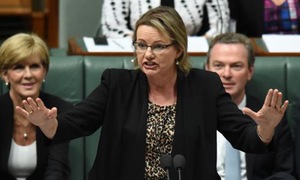
The federal health minister, Sussan Ley, has ruled out redirecting $1bn from inpatient hospital care to community mental health services, as a leaked government-commissioned review had proposed.
Before the 2013 election, the Coalition committed to a comprehensive review of mental health services, which has since been carried out by the National Mental Health Commission.
Its report, which focuses on what the commonwealth can do to improve access to mental health care, was delivered to the government in November but has not been made public.
A summary of the review was leaked to the ABC on Tuesday. Among its many recommendations, the commission said $1bn in acute care hospital funding should be redirected towards community mental health services.
On Wednesday a spokesman for Ley confirmed the government had ruled that option out.
In a statement Ley said the review was “to the government, not of government, and any recommendations will need to continue to be scrutinised in consultation with the mental health sector and other levels of government”.
But the context for the commission’s recommendation was unknown, because the full 400-page report has not been released. Ley would not say when the government intended to make it public.
A lead author of the report and the national mental health commissioner, Professor Ian Hickie, said he could not comment on the report or Ley’s response until the government officially released the full document.
In October, Hickie and other experts told Guardian Australia that investment in community mental health services was shrinking and that governments were directing funding too heavily towards acute care.
The leaked 22-page summary also recommends the government develop a national mental health and suicide action plan in conjunction with the states and territories.
Earlier this month, the Australian Bureau of Statistics released its 2013 data on causes of death in Australia which showed suicide remained the leading cause of death for Australians aged 15 to 44.
The commission identified mental health services for Aboriginal and Torres Strait Islanders as a priority.
Sebastian Rosenberg, a senior lecturer in mental health policy at the University of Sydney’s Brain & Mind Research Institute, said the summary revealed governments were struggling to curb the mental health crisis.
“There have been about 30 inquiries into mental health in Australia over the past decade, including this one, many of which are gathering dust on a shelf despite making sensible recommendations, many of which have never been implemented,” Rosenberg said.
“This report largely demonstrates mental health remains in crisis, and at the core of that is a significant mismatch between funding available to mental health and mental health’s contribution to the burden of disease.”
About 5% of total health budget expenditure was directed towards mental health, while mental illness contributed to about 13% of Australia’s burden of disease, Rosenberg said.
Unlike hospitals, community mental health services and programs fell into a funding grey area, he said, which meant many programs lost funding after a short period or were never extended beyond pilot stages.
“So these are services like psychology and social work programs, employment and homeless services, rehabilitation programs, programs provided by outreach services, which receive a tiny fraction of funding,” he said.
There was a “fundamental need” to move away from an approach to mental health which meant many patients were getting help only when they were in crisis, he said.
“A study from 2006 indicated about 43% of all general mental health acute beds were occupied by people who would be better served in other settings if those settings were available,” Rosenberg said.
“However, people are very nervous about reducing the number of acute beds as there is a paucity of alternative support available.”
Ideally, rather than redirecting funding from acute care towards community care, more money would be made available, Rosenberg said.
This would be particularly important in targeting young people with mental illness so they could be helped before crisis point and encouraged to stay in school and work, he said.
The CEO of the national mental health charity SANE Australia, Jack Heath, called on the government to release the full review and its response to it as a matter of urgency.
Heath said funding for community-based mental health care should not come at the expense of acute services.
“All levels of government need to get on with the job of creating a mental health system that provides the appropriate support and services to people when and where they need it,” he said.
“To do this we need determined leadership at a national level, backed by strong support across all political parties – this is one issue where we should be able to work together free of politics.”
